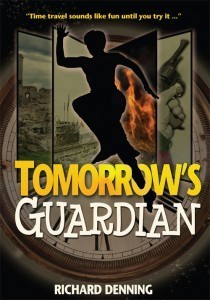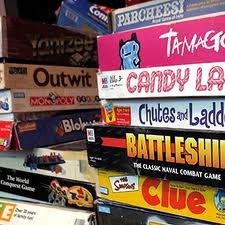Richard Denning's Blog, page 22
December 11, 2010
The basics of editing fiction
Some 18 months ago I started on the journey of learning a little about polishing a fiction manuscript. I had been writing fiction for 10 years and not getting that far with interest from agents or publishers and so decided to involve a Literary Consultancy. Now these organisations, for those who do not know, will look at your manuscript and comment on it. You agree a level of editing that they will offer. There is of course a cost to all of this and it is not cheap BUT having spent about 6 months sending material back and forth, getting comments and critiques and then rewriting and trying again, I felt that the end result was worth it.
I had learnt quite a bit in that time about the pace of the story, enhancing descriptions and characters and there is no doubt the book (The Last Seal) had improved. A year ago I decided to self publish three books that I had written. The books have gone down fairly well with a small readership. That said I was not foolish enough to believe I had learnt everything I could do about editing and indeed another step forward was reached when a published author – Helen Hollick – took me under her wing and gave me suggestions of how a book could be polished even further. The end result is that I am now using the same superb editor she uses – Jo Field. Helen and Jo put together a PDF called Discovering the Diamond ( at www.helenhollick.net/Resource/DiscoveringTheDiamond.pdf ) that I would suggest is required reading on the subject of editing fiction.
Here are a few bullet points on specific aspects of the art of writing that noobie wanabee writers like myself often get wrong and where, given time focusing on them, you can improve your material.
Author's Voice. You are an expert on flintlock pistols. You know all there is to know about it and you are writing about 17th century pirates. You can fall into the trap of reproducing a text book explanation of the loading procedure of a pistol. Now the reader, who perhaps has been getting to know your pirate, is suddenly dragged out of the illusion they are seeing the world through the pirate's eyes and now is aware of the author behind the description. If instead of this you write a passage showing the pirate loading the pistol while in the middle of a battle with cannon balls whistling by overhead, then the reader will hopefully feel more embedded in the narrative, feel happier about the story, feel more convinced by the world because the detail is being painted BUT not feel that they are being lectured to by the author.
Point of View. Helen and Jo refer to the concept of 'Head hopping ' where the reader sees the world through a variety of different pairs of eyes. One moment you are inside the head of the Pirate, the next his first mate, the terrified women on the ship they are chasing etc. Now assuming that your book is written from more than one perspective then at some point you will move from one character's view to another's, BUT if you do it too often you can confuse the reader. They just get used to how Scurvy Pete feels about the world when they are whisked away into the mind of Fragile Freda. As a rule it is best to follow a scene through in the mind of one character and then only change Point of View when you change scenes. Later in the book, when the reader is used to the characters they will accept a POV change more than earlier in the book.
Show don't Tell. This concept is about letting the reader FEEL, SMELL SEE, TASTE and HEAR the action and not just be told it is happening. So rather than just say that the Pirates made the frightened passengers walk the plank, why not describe the scene and show the terror on the faces as they fall into the shark infested waters.
Continuity. This is one thing that I really had to learn and when Helen first read my book she picked up on one instance where my demon lord bursts through the front of the church and he is pursued by a Warlock who follows him outside. I then describe the peaceful scene outside before finally having the people react to the demon. Now, ask your self, IF a demon bursts through the front of a stone church with the accompanying noise and carnage is it likely that there would have been much peaceful going about of business. Another example of continuity error is if you have the pirate hero wounded in one scene and in the next (set only hours later) he is running unimpaired down the street.
What about the comma? Now you will note that none of the above talks about commas, missing full stops and spelling errors. Do these matter? Well, yes of course and need to be picked up before printing a book. But almost anyone can check a book for those errors whilst the above errors and faults may not be spotted by the average reader. They just know the book is not that good but they cant say why. Most folk THINK editing is about someone checking for spelling errors. That needs to be done but really is a minor part of a larger job.
The Professional Editor and DIY.
You can do quite a lot of editing yourself. Naturally if you read up on the subject you will improve the book you have written a lot. BUT at some point you need to hand it over to an editor. Published authors may have these provided for them in their publishing house, although these days many publishers are expecting writers to hand them over a finished manuscript. Certainly if you self publish it is well worth the money to involve a professional editor IF you can afford it of course.
Someone looking at the work fresh for you can see many errors that the writer misses. It does not mean you are a poor writer. Editing is a skill in itself after all. There are many editors around but I can recommend Jo Field. Contact her via:
:jo.field3@btinternet.com
I conclude by saying that by no means do I believe that I am an expert although I believe I have picked up some of these ideas through the last few months and I hope you may be able to see the benefits of applying these concepts in my own book Tomorrow's Guardian which is re-released in paperback very soon. See: http://www.richarddenning.co.uk/

November 14, 2010
Space Captain Smith
[image error]
When I started reading this Sci Fi novel I took a while to get into it. I was expecting a heroic tale of daring do set in a future British Space Empire – a sort of Space 1899 type adventure. And in a way that is what I got. We have a future world where the nations have spread out into space and the UK has carved out its chunk of territory very much like the 19th century expansion of the empire under Victoria.
However whilst that is the type of background world Toby Frost has created the style of this book is a comedy. We Brits have carried with us stiff upper lips, cold showers, traditions and tea. The hero, Captain smith has a crew consisting of a sex mad android pilot and a blood thirsty warrior alien who collects his victims skulls.
The story is actually pretty straight forward – alien race who want to wipe out humanity are after the passenger on Captain Smith's ship for reasons it is best to read the book to find out.The crew get into a series of adventures before winning the day.
As a story it is nothing that special but the humour is entertaining and the banter between the crew amusing and at times laugh out loud funny. It is a light read and whilst maybe rating say not more than 3.5 to 4 stars out of 5 (in my opinion) I would be up for a sequel.

November 11, 2010
Paperback of Tomorrow's Guardian coming soon
Tom Oakley experiences disturbing episodes of déjà-vu and believes he is going mad.
Then he discovers that he's a "Walker" – and can transport himself to other times and places.
Tom dreams about other "Walkers" in moments of mortal danger: Edward Dyson killed in a battle in 1879; Mary Brown who perished in the Great Fire of London; and Charlie Hawker, a sailor who drowned on a U-boat in 1943.
Agreeing to travel back in time and rescue them, Tom has three dangerous adventures, before returning to the present day. But Tom's troubles have only just begun. He finds that he's drawn the attention of evil individuals who seek to bend history to their will.
Soon, Tom's family are obliterated and Tom must make a choice between saving them and saving his entire world.
Tomorrow's Guardian is a Young Adult Fantasy Novel.
Tomorrow's Guardian Paperback publication date: 27 December 2010
ISBN: 9780956483560 (Hourglass Institute Series Book 1)
Reviews:
What Robert James says about Tomorrow's Guardian:
'Richard Denning, … keeps the action fast and furious for the 400 or so pages of the book. Diving in and out of time, and in and out of the Twisted Reality (the other universe), there's never a dull moment as the inevitable confrontation with the evil Redfeld, villain of the piece, comes closer and closer.'
'I recommend it to readers around Tom's age, many of whom I confidently expect to absolutely love it. '
Read the full review here: http://thebookbag.co.uk/reviews/index.php?title=Tomorrow's_Guardian_by_Richard_Denning
I recieved Tomorrows Guardian on Thursday and my youngest James (10) and I are reading it together. It's causing bedtime issues in that he wants to read more than time allows.
Great story. Sue Rankin
Flamingnet (US Teen Fiction website)
Teens will love this book because they can relate to Tom who is their age and very believable. Since Tom is from another country, the reader has a chance to travel to another place. With Tom's time traveling, the reader gets taken to a different time too.
Full review here:
http://www.flamingnet.com/bookreviews/newreviews/newbookreview.cfm?title=Tomorrows%20Guardian&CFID=43812585&CFTOKEN=13523675
Coming spring 2011, The Hourglass Institute book 2: Yesterday's Treasures
Everyone is searching for pieces of 'The Crown of Knossos:' historical artefacts which when assembled allow control over all of history in this and in the Twisted reality. The Hourglass Institute, Redfeld's masters and even the Directorate are soon in the hunt. One by one the pieces are found but eventually Tom and the others discover who is really after The Crown and what their motivations are.
Then they realise the extent of the danger, for 'Yesterday's Treasures' can mean the destruction of tomorrow.
Find out more: http://www.tomorrowsguardian.com/

November 7, 2010
So you have written a book- why not self publish?

The logo for Mercia Books.
Like many many people I have written several novels with more on the way. Also, like many many people, I have tried to get an agent and a publisher with varying levels of success and interest. It is a hard time to get published but there are other options.
Having been writing for 10 years I decided a year ago to take the plunge. I was going to have a go at self publishing.
What followed was a voyage of discovery, errors, disasters and successes in pretty equal measure but I feel that I have learnt quite a lot in this 12 months so I thought I would share some of it.
What I did
Having tried to get published and not hooking an agent I enrolled with a Literary Consultancy in Oxford. What followed was a passing back and forth of a manuscript for The Last Seal. Over the course of 6 months the book improved dramatically from them making comments and suggestions and me redrafting and passing it back to them. The only down side to this is it does cost money. Having a consultant discuss and advise on a manuscript will cost a few hundred pounds. That said I do think I learned quite a bit about writing and the final MS was much better. It was good enough indeed to be sent for by a publisher who although rejecting me did send a 3 page letter discussing its merits and areas of improvement and asking me to send more material.
Most importantly I now felt that I COULD write. I was starting to learn the ropes.
Later I took on an editor and the MS improved even more. Indeed the most important lesson of all is get the MS professionally edited before you send it to agents and publishers and before you publish it. It can transform a book from fair to good to even great.
OK, so I now had a decent MS and I used the same approaches I had learnt from this process to sharpen my other books.
Now what? I researched self publishing. There appeared to be 3 ways to do it:
1) Use a company who would do all the work, even create a book cover design as well as laying the text out. These though can be costly and often do little to promote your book. That said it is the easiest approach if you lack IT skills. An example of such a company are Author House.
2)Use an online self publishing service such as Lulu and Completely Novel. In both cases you upload a work document and the online tool converts it for you. You do have to lay out the text a bit but don't need to know about PDFs etc. You can design a cover online and use stock images or upload an image. In both cases quality is fair. The problem with Lulu is it is US based and although it can print in the UK any online sales via Lulu are in the states which brings in US Tax issues. Completely Novel are UK based and very helpful and supportive. This approach is a middle way in that you get more control and can keep costs under control BUT the per volume costs are fairly high and paperbacks are likely to sell on Amazon for at least £12. That is too high IMHO.
3)Become a publisher. I did this in the end. It is actually not that hard. First register via Nielsen and get 10 ISBNs (book numbers). Then approach Lightning Source or Anthony Rowe or even other printers. LS and AR will sort out registering your books with Nielsen. If you go to a printer direct you will need to do that yourself.
You need to register the books so that they appear in the book distribution lists at Bertrams, Gardners etc and so are available to book shops. Then you create a PDF of your book and a PDF of the cover following exacting instructions. This is technical and you will have to read the extensive notes provided by LS (in my case) to learn how. One piece of advice – DO NOT PUBLISH IN HARDBACK. This is costly and a major mistake I made.
Now you order the books. When they arrive you start to market them. This can be done locally at shops, hauling yourself around craft and book fairs and MOST importantly ONLINE (see later). This is HARD work and takes a lot of time and effort but if you chip away at it a little a day you can get some interest.
What I recommend
TAKE YOUR TIME and don't rush.
Firstly work and work at that manuscript. Polish and polish. Put it to one side. Leave it 2 weeks and then read it fresh. Then when it is as good as can be, get an editor to work on it and polish it. YOU ALL NEED this. Think I am wrong? All published authors have editors. You need one. Believe me.
Then try the agents and publishers. If you cannot hook one it does not mean the stuff is poor. Publishers take on only a minute number of new writers. You don't fit their list but that does not mean readers wont like it. When you have decided to proceed in self publishing, research around the subject. The Authonomy website has useful advice in its forums. Read up on Lulu, check out self publishing companies. Be careful – there are rogues out there. If in doubt go on Authonomy (a website of authors) and ask about the company.
Find out if you can cope with creating professional book blocks or if you want someone else to do it.
Consider engaging the services of a book cover artist to help there unless you have talent.
MARKET the book.
This is a whole subject in itself and there are hundreds of websites with advice. Be careful you don't spend too much money on books, courses or guides that promise to tell you the secrets of becoming a best selling author. Much can be done for free.
Get on Facebook and engage with people. Get on Forums in your subject. Blog a bit around your subject.
Create a really cool website. Make Utube videos. Make e-book versions and get them on Kindle. Learn about search engines and how they work. See about doing talks locally. Keep an eye out for clubs, locations etc that might be interested in the book.
I will try and do a longer piece on this BUT YOU MUST MARKET THE BOOK.
If people don't know about it they wont buy it.
That is it for now. More on this another time.
Richard Denning is a historical fiction and historical fantasy writer. Find out more about his books here:
http://www.richarddenning.co.uk/
He also writes occasional book and board game reviews and online articles on historical and gaming related topics. He owns his own small publishing house Mercia Books and is part of a board game design house Medusa Games.
A keen player of board games and other games Richard is one of the directors of UK Games Expo (the UK's largest hobby games convention). He is a board game designer and his first Board Game 'The Great Fire on London 1666′ was published by Medusa Games and Prime Games in October 2010.

October 3, 2010
Tips for collecting board games
So you want to start a board game collection? Before you rush down to Wallmart or Toys R Us though, there are some questions to ask yourself:
Why are you collecting board games?
What do you know about board games?
Where can you find out about new board games?
Where can you buy board games and where can you sell them?
How much are board games worth and are they a good investment?
Why are you collecting board games?
There are two main reasons to be starting a board game collection.
The primary reason is because you want to play the games. Board games are great for social occasions. Get your family and friends together for game night. Buy some munchies, get some games out and enjoy yourself. This can be competitive – beating your best mate at a tightly fought game of Risk brings bragging rights – or just a chance to relax and share time together. If you want to take it further you can find a local board game club and join them. Turning up with an existing number of games – particularly new ones the members do not know – is a good way to break the ice. Members of a club might want to start a collection that they can each share and use. That way an investment of say $40 or £30 each for ten members gives you a nice library of games, whereas a single member may not be able to afford to buy ten games himself. You can find local clubs on Board Game Geek (see useful links below) or via Google.
Another reason for starting a collection is to consider it as an investment. Board games do have value and some rare/out of print games can fetch a premium. This aspect is explored later in the article.
What do you know about board games?
The chances are if you are interested in board games at all you may know a fair amount about them. However it is quite likely the case that if you asked the 'average man in the street' to name ten board games the list he would give you would be:
Monopoly
Cluedo (or Clue)
Scrabble
Risk
The Game of Life
and at this point he scratches his head says "er …Trivial pursuit" and then grinds to a halt.
Do you know that right now there are something like 48,000 board games listed on the world's biggest board game hobby website: Board Game Geek? If you have never heard of Board Game Geek then the best home work and preparation for exploring this subject is to go there and educate yourself about board games. At the very least you need to familiarise yourself with the broad sub groups of board games. These include:
Abstract games (like Go)
Family Games (with an appeal to the whole family but usually involving a large slice of luck. Monopoly is one such game.)
Wargames (where the refighting of battles and wars is the central theme)
Party Games (designed for a fun half hour or so at a social gathering and accessible to all – Pictionary is a good example.)
Strategy Games (These are more complex, challenging but rewarding games with lots of choices and little in the way of luck. The game Settlers of Catan is an example.)
This just scrapes the surface, but time spent on Board Game Geek should prove worthwhile.
Where can you find out about new board games?
The likes of Wallmart and Toys R Us generally do not release many genuinely new games. Most games there are reprints of Cluedo or Monopoly or quiz/TV/movie tie in games. These are seen as safe sales. Every family will buy some sort of such game each year. The big companies are really not interested in the much smaller market of the hobby gamer. If you want to find out about the exciting and new in terms of board games you can subscribe (for free) to Board Game Geek or join (for $10 a year) Board Game News – a site designed to keep the industry and the keen gamer aware of the latest news.
Another very fun way of learning about new games is to attend a games convention. In the US the biggest conventions where board games will feature are Origins and Gencon Indy, drawing crowds of 30,000 to 50,000 attendances. In the UK the author's own convention, UK Games Expo, is the largest such event with 3500 to 4000 attendances. The biggest convention in the world is Essen Spiel in October in Germany with over 100,000 attendances over the very full and busy 4 days. If you are serious about this subject then a trip to this Mecca of board games is not to be missed.
Where can you buy board games and where can you sell them?
A very small range of board games are sold by the large chain shops. Since the high street stores do not have an exciting selection, it is necessary to look elsewhere to start your collection. There are four main sources of board games.
Online purchasing via games retailers. Googling board games should yield a vast range of companies selling board games. You are advised to shop around and compare prices as there is often a spread of prices for the same game. Here in the UK, Leisure Games, Spirit Games and Games Lore are just three worth looking at.
Online purchasing via auctions. Ebay auctions often yield out of print games as well as deals on new games. It is also worth looking at Board Game Geek which offers members a market place – both using real currency and BGG's own Geek Gold. These sites offer you the ability to sell unwanted games from your own collection.
Buying from a games convention. Again this is the most fun method. Attending a convention provides the opportunity to 'try before you buy' as you can sit down and play a game as well as seeing many out of their box on display which you don't get at a high street store. Often there are deals on offer at conventions which allow for cheaper purchases, although you have to factor in admission prices of course. Most conventions will have a flea market/ bring and buy/ second hand area where you can sell your games. Usually you pay 10 to 15% commission to the convention or whoever is running the flea market.
Buying from a bricks and mortar hobby games store. These are not usually on high streets and you need to Google to find them but there are for example at least 30 such shops in the UK alone. Prices are usually higher at a physical shop than online, but the advantage is that the hobby shop owner often knows about games and can discuss them intelligently with you. Furthermore over time you can develop a relationship with the shop owner. Shops will usually buy games off you or allow customers to sell games in the store, again for commission.
How much are board games worth and are they a good investment?
The value of a board game will depend on the quality of it. That usually means it is complete with no missing components, the board is not bent and the box not scratched. Another factor will be its rarity and also whether it has obtained a cult status. Thus an out of print popular game might yield more than an in print current game that is not rated highly. Here a study of BGG ranking system, to see how popular games are, can be useful.
It is possible to make money buying and selling board games but do not expect to make a fortune quickly.
Trawling round conventions, pouring over the flea markets, visiting shops and digging in the bargain buckets and lucky finds at car boot /yard sales might just yield a rare out of print game. First editions of classic family games can sometimes appear on Ebay and occasionally go for a large fee. For example right now on Ebay UK you can find a copy of the Buccaneer Game By Waddingtons 1958 up for auction at £159. Old Avalon hill wargames (the type with 2000 cardboard counters in) are often in great demand particularly in the USA if they are of good quality and not missing pieces.
A more modest but more regular income can be obtained buying up many less rare games and putting up a web store or selling on Ebay. Readers are advised to study Ebay and BGG market place prices. Keeping an eye on forum postings where people state what they want to buy is also worthwhile.
There are certainly many individuals who turn a nice profit buying and selling board games. The advice here is get to know the market so you know whether that slightly dog eaten copy of Titan, in a charity shop at £1, might sell for £50 at the right place.
All of that said the worth of a game to the writer is not financial. Not far from the keyboard being used for the writing of this article is a room with maybe 400 board games in. Every one of them has at some time found its way onto the table. The true value of a game to the gamer is not monetary, but rated in terms of how often you want to play it.
Useful Links
Board Game Geek : http://boardgamegeek.com/
Board Game News: http://www.boardgamenews.com/
Essen Spiel: http://www.internationalespieltage.de
Gencon Indy: http://www.gencon.com/
UK Games Expo: http://www.ukgamesexpo.co.uk/
Origins http://www.originsgamefair.com/
About the Author
Richard Denning is one of the directors of UK Games Expo. He is also the designer of the board game The Great Fire of London from Medusa Games.

October 2, 2010
Sea Witch by Helen Hollick
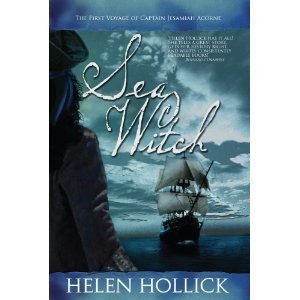
This is the first of Helen Hollick's books I have read and on the strength of it I have now bought book two as well as the Arthurian series. I am half way through book two and getting to know the characters even more.
This is a fun blend of authentic historical action adventure in the pirate era – you can almost hear the rigging creak and the wind blow – with a light touch of fantasy and sorcery.
The story is that of a rogue pirate Jesamiah and the young girl destined to be his lover, the white witch, Tiola.
Jesamiah is a engaging hero and Tiola, an at time fierce heroine. The story winds back and forth between them keeping the reader interested in both main protagonists.
Hollick is not afraid to use graphic descriptions both of the fighting scenes and the sexual encounters and manages to portray a grimey, often desperate world with believable heroes and villains.
You can tell that more books were planned right from the start as there are major characters introduced who are designed to be recurring figures. A sense that more is yet to come is also apparent in the fantastical parts – in particular the interaction between Tiola and Tethys a goddess of the sea.
The descriptions are rich and detailed, the dialogue authentic and laced with many 17th century expressions and curses and as such may not suit some readers not used to archaic terms. But anyone reading a historical novel is generally after the detail – the feeling that you are living the moments with the characters and you certainly get that here and Hollick does not drown you in detail: it is more a case of being nicely immersed.
Well recommended.

September 12, 2010
Notes from a noobie board games designer
Late at night in a bar in 2007 after attending the greatest board game convention in the world – Essen Spiel – several of the UK Games Expo organisers fell into a discussion common no doubt to the many gamers who attend – ideas for board games. Most of mine and the others ideas lead nowhere, but I had a beginnings of a concept for a game involving some disaster and trying to survive it. The initial idea was far from a game about the Great Fire of London – it was actually about British soldiers trying to escape the collapse of their army at Isandlwana on the eve of the battle of Rorke's Drift in 1879. That game never seemed to work, but whilst I was working on it the Great Fire of London popped into my mind and would not go away.
Ferrycon I
In early October 2008 I ordered a map from Amazon.
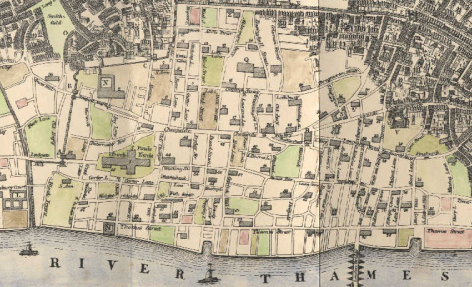
It was actually drawn in 1667 (the year after the fire) and showed the extent of the damage. Using this I sketched a very crude board on two pieces of A4 card.
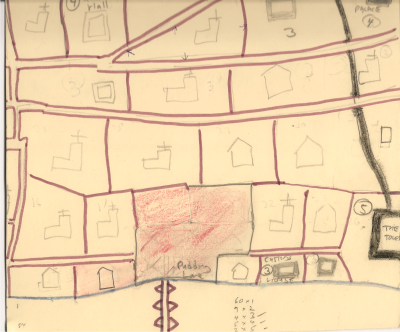
I also produced hand drawn cards which the players would use to manipulate the fire. Using wooden counters picked up at Essen in 2007, the first Great Fire prototype was created in time for Ferrycon 2008. This term was coined by a friend, Pete Heatherington, after we both agreed to take early prototypes of our games on the cross channel ferry. As we sat down to play through the 90 minute crossing, a Welsh Male choir on board (and mostly at or near the bar) started to sing 'Men of Harlech'. The first play test of Great Fire took place against this backdrop. (Incidentally Ferrycon has been repeated on our crossings to Essen and some battlefield tours we do and Ferrycon IV will take place during our crossing in October 2010. So if you see a group of men huddled round cardboard boards and wooden pieces on the Dover to Calais Ferry, come and ask to play.
Any initial play test will be naturally bumpy (especially if affected by being on a ferry tossing about or the distractions of close harmony singing) but showed potential and so on the drive through Belgium we continued the discussion and analysed the combinations of numbers of houses, districts and players that could make up the game. I was away and on my return from Essen I was ready to make a proper prototype.
Early Prototype
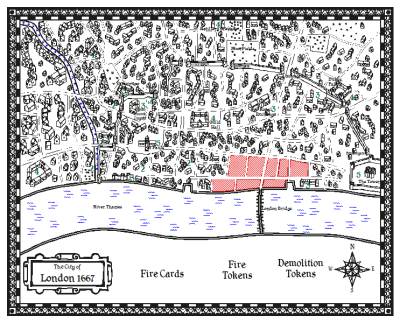
I was already familiar with a piece of software called Campaign Cartographer by profantasy and discovered that expansion files for it allowed the drawing of 17th century maps in the style of the cartographer of the time, John Speed. The First attempt at the game board and all later prototype ones used Campaign Cartographer. The first play throughs were at the October Wargames Association and my own Monday night home gaming group. The mechanics were holding up well but at this stage players got 2 pts for each house that survived and that was about it. It was still fun but it was obvious that we needed something to strive for in the game beyond just burning other player's houses. Suddenly inspiration hit me in the middle of an after game debrief when I looked up and saw the game Risk sitting on my shelf and it occurred to me that we needed objective cards. So the first objective cards were made giving points if certain important buildings survived.
Midcon Version
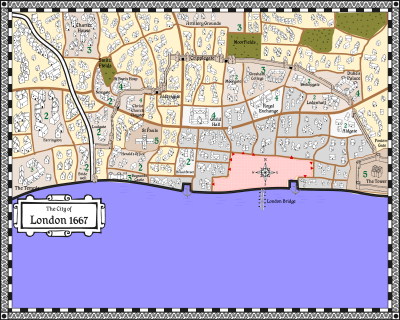
Midcon is a friendly board game convention that occurs in November in Birmingham. It was a chance to twist a couple of arms and get an opinion on the game from the gamer. I actually ran 3 play test sessions that weekend. Embarrassingly, I made an error on the board and the date of the original map I copied from (drawn in 1667) was brought across so the version I took to Midcon had 1667 emblazoned upon it. This was spotted by Dave of the Halesowen board gamers. At least that boob could be quickly corrected.
By Midcon 2008 the board now showed objectives – as lightly shaded areas. However at this stage there were more than the 12 we eventually ended up with. I also had a number of other objectives than the 12 buildings such as whether the fire reached a certain map edge or the river BUT these were later dropped. We played around with many such ideas but found there was a high element of luck in what cards you got. At this stage the initial set up of the game was still very random and massive elements of luck could apply to where your houses ended up on the board. It was clear that a LOT of work needed doing to knock this game into shape.
Winter Play testing
By now David Norman of JKLM was heavily involved having played the game at Midcon. Some many dozens of emails later and the game started to tighten up. Over the winter of 2008 to 2009 David brought his analytical mind to the mechanics – but never dominating and always encouraging me to come up with ideas and concepts. It was quite a fun period as his group and mine were playing it a lot and ideas were flying all over the place. By spring 2009 we have a score track appearing, we have a map grid, we have 4 zones to the board to make for a more even spread of houses and the 12 objective had been settled upon. We also developed 3 sets of objective cards to ensure everyone got one near to the fire, 1 middling and one further out. We had also brought in Fire Intensify cards which would allow extra fires to be added to dying ones and Double Fire Move cards to allow unpredictability in how far fire could move.
UK Games Expo 2009, Essen, Midcon again and Dragonmeet
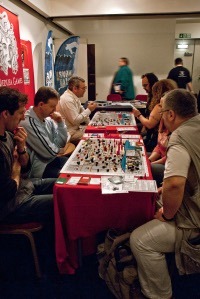
The game was now ready for exposure to the public again after 6 months development from Midcon. I now embarked on 6-9 months of hauling the game round cons and getting it played by groups in Birmingham, France, Germany and Manchester as well as running 4 sessions of it at Essen. The result was pretty good support and enthusiasm. These play tests though threw up a few minor issues and niggles. These were about the balance of objective cards and the use of demolition charges (or the tendency not to bother to use them) and fair the distribution of Fire Intensify or Double Fire Move cards. So, tokens were introduced for double fire moves, demo charges as well as additional victory points and placed on the board so as players moved fire over them they got access to them. Card stacks on the board were brought into make sure each player got the same chance to intensify the fire.
Finally by Dragonmeet 2009 what I felt was the final playtest version was revealed and went down well. So it was that the game was ready for Markus of JKLM to take on to production.
Publication
Now the publisher involved Andreas Resch an artist who took my ideas and produced production artwork such as this board:
[image error]
The game is due out in October – hopefully in time for Essen Spiel in Germany and will be available through certain game stores.
Phew!
This whole process has been one hell of a ride and I am full of respect for full time game designers and those who make a living from this process. It takes a lot of time, many play tests and revisions to make a game. You have to grow a thick skin because you will get negative comments and not everyone will like your idea. But, I think eventually holding the finished product in your hands and saying "I am a Game Designer" is worth it.
Would I do it again? Well, I have this idea …
Richard Denning of Medusa Games is the designer of Great Fire of London 1666.
See www.medusagames.co.uk

July 23, 2010
Which is your Favourite Dr Who?
I think I must be odd. I often see posts arguing over who their favourite Dr was. There are quite a few who liked Tom Baker (number 4), many who rave about David Tennant (10) and a good following for Matt (number 11). But I like them all in their own way.
Lets have a quick refresh of the Drs.
1st Dr William Hartnell

The first Dr. Rather an anti hero at the start – the grumpy old man who went on the run from his own people .You grown to love the character after a few early shocks.
2nd Dr Patrick Troughton
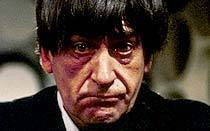
The hobo, vagabond and cheeky cheeful Dr with the recorder. Seems a fool at times till he produces a trump card. For me he is a strong favourite
3rd Dr – John Pertwee
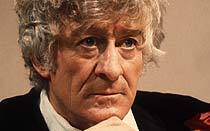
The dandy with the yellow car Bessie. The dr of the classic Unit stories (and some REALLY great ones). Action Doc with the Karate chop.
4th Dr Tom Baker
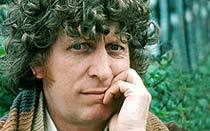
Would you like a Jelly baby? The scarf. Bohemian DR wit the longest stint in the post. And probably the bets series of all (his first -Giant Robot, Arc in space, Sontaran Experiment, Genesis of the Daleks (awesome), Revenge of the Cybermen.
5th Dr – Peter Davidson
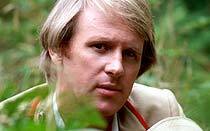
If I had to choose a favourite THIS would be him. The cricketer Dr, with quiet courage, some of the best little scuffles with the Master and one of the longest companions: Teegan.
6th Dr: Colin Baker

Hard done to by the BBC. Episodes were poorly funded. Eventually cancelled. But one or two stories were really excellent. Would have liked to have seen more.
7th Dr Sylvester Mccoy
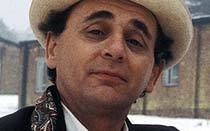
The last Dr of the Classic series. Had some VERY good episodes. Battlefield (the Brigadiers last), Silver Nemesis are two superb ones. Promised some great story lines before the bbc pulled the plug.
8th DR Paul Mcgann
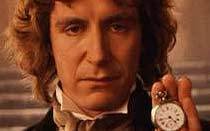
What happens when you let US film makers loose on a classic program – they screw up. Paul Mcgann himself was great as the DR and went on to make some excellent CDs – get them if you can for they are some of the best DR Who stories.
9th Dr – Christopher Eccelston
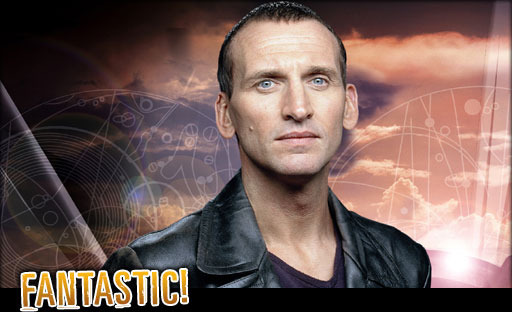
Brought into reprise the role and did a decent job. Not my favourite DR Who and hampered (IMHO) by a bit too much SOAP influence of needing to sort out companion's mothers and other ties(which lingered on into David Tennant's tenure- what is wrong with just good stories.) Never the less a good start.
10th Dr David Tennant
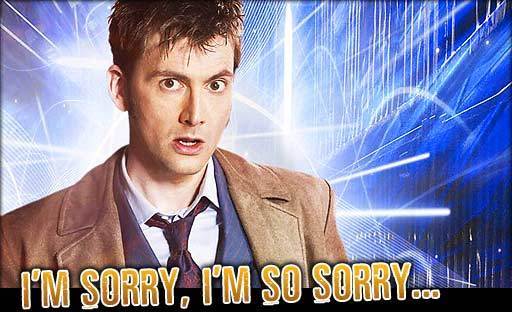
In the way that Tom Baker defined the role in the 70s Tennant did in the latest series. Light hearted at times and maudlin in equal measure – he was always going to take some following.
11th Dr Matt Smith
[image error]
But Matt Smith managed to do it. His youthful enthusiasm and confidence shines through and Matt has made a superb latest incarnation.
So who is your favourite?
In the end these arguments about who was the best Dr Who miss the point in my opinion. Dr Who transends all the individuals who played the part. Each in their way defined the character in some fashion and each added something to him but to me DR Who is more than any one character. Its that overarching story, its the optimism and hope built into even the darkest stories that there is this man trying his best to protect everything. Each should be enjoyed for what they bought to the part. Why argue about who is best when DR Who is just dam fine Television.

July 13, 2010
Time Travel in Books, TV and Film
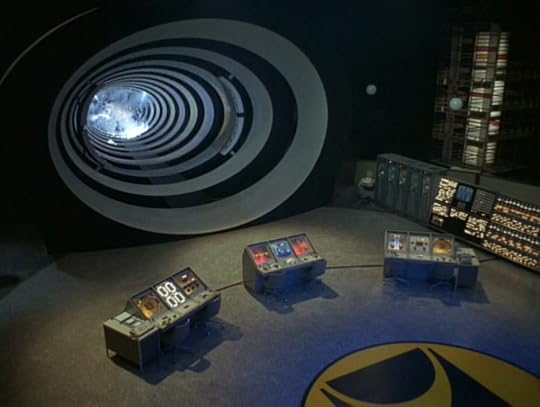
Time Travel fascinates us. The dangers and potential gains along with the adventures that might be had are the stuff of a wealth of books, TV programmes and Films. No wonder: for Time Travel produces intriguing possibilities and 'what ifs'.
There is the desire to explore the past that many of us have. We like to go on holidays to exotic locations, to see the world and different cultures. We like to be present at important moments – a sporting triumph maybe or to meet celebrities and famous people. But, the majority of the cultures that have existed, the bulk of the famous people the world has produced, many of histories greatest of moments have been and gone. Time Travel raises that chance of maybe meeting Leonardo DaVinci, Mozart, Caesar or Cleopatra. There were once seven wonders of the ancient world. Of these only the Great Pyramid exists. How wonderful to be able to visit the other six. Think how marvellous to be present at the moment Newton discovered gravity, to sail (and hopefully get off) the Titanic or how fascinating to see the first airplane flight.
Then there are the dangers of Time Travel that make it intriguing. Could you get trapped in the past and never return to the present? Could you meet and kill your own ancestor and so never exist. Could you prevent the discovery of fire, the light bulb or penicillin. The possibility of changing history and so creating a different future is explored in many Time Travel adventures.
Here are some of the more famous Time Travel adventure stories:
TV
Dr Who (1963 to Present day). The world longest running Sci Fi and Time Travel story and to many of us a cornerstone of our culture. I have enjoyed all the stories – watching the older stories on cable later and still watch Dr Who today.
Time Tunnel 1966-1967. Two US scientists tumble through a tunnel in time that drops the off in one time period of an adventure and then whisks the off to the next. I remember that image of them rolling around in the tunnel and then out into a street somewhere from 1970s and later re runs.
Star Trek. Although mainly about space exploration and fighting Klingons there are a number of time travel stories in all the series. "The City at the Edge of Forever" where Mccoy, Spock and Kirk end up in the US during the depression and possibly wipe out the entire future is fascinating and an abiding favourite of mine. The movies take a slightly comical view of time travel in "The Voyage Home" when they have to go find a whale in the 20th century to save the future. The Next Generation episode "Cause and Effect" is one of my favourites with the crew repeating the same day multiple times until they can prevent the disaster that flings them into the unending cycle.
Movies
The Time Machine (1960) is a classic and based on the HG Wells novel. This was an early treatment of this genre. Time travel here is into a alien future in some post apocalyptic world taht was not a place you would want to visit. But I loved the Time Machine itself with its Victorian stem punk style knobs and levers.
Back to the Future (1985) and its sequels were entertaining teen adventure stories. The first film I saw at university and I have to say that despite the technobable science was just a fun film, but it did explore interesting themes. What if you parents don't marry – do you cease to exist? What if you change the past -what will the future be like? How easy is it to change the future?
Terminator (1984) and its sequel are about cyborg assassins being sent back in time to kill a future leader. I enjoyed the first two movies and felt they were complete and we did not need any more. The message changed from the hopeful – we can change history nothing is written in stone – to the grim – nothing we do changes anything! Maybe I like happy endings too much!
Time Bandits (1981) Now this one was fun. Thieves steal a time travel map showing gates between time periods and use it to try and rob their way across history. Comedy but explored that idea of meeting the famous characters from history who of course turn out to be not quite as you expect them to be.
Books
I have already mentioned The Time Machine by HG Wells. Mark Twain's A Connecticut Yankee in King Arthur's court is also an early novel. This one explores what happens if a modern day man ends up in the past. It takes a slightly condescending view that modern ways must be better than in the past and the movie version takes this further with the traveller trying to teach the court Jazz music!
There are dozens of books that use time travel and the one thing that is obvious when you read them is that pretty much any method of time travel, any reason for doing it, any adventure you might have through it has been thought about. That however does not stop us wanting to read more, see more movies and in some of our cases write more books about this most fascinating of genres.
Having said all that it is not surprising that I have written a time travel story myself – and here is the plug:
Tomorrow's Guardian:
Tom Oakley experiences disturbing episodes of déjà-vu and believes he is going mad.
Then, he discovers that he's a "Walker" – someone who can transport himself to other
times and places. Tom dreams about other "Walkers" in moments of mortal danger: Edward Dyson killed in a battle in 1879; Mary Brown who perished in the Great Fire of London; and
Charlie Hawker, a sailor who drowned on a U-boat in 1943.
Agreeing to travel back in time and rescue them, Tom has three dangerous adventures,
before returning to the present day. But Tom's troubles have only just begun. He finds that he's drawn the attention of evil individuals who seek to bend history to their will.
Soon, Tom's family are obliterated from existence and Tom must make a choice between saving them and saving his entire world.
Tomorrow's Guardian is a Young Adult Fantasy Novel.


